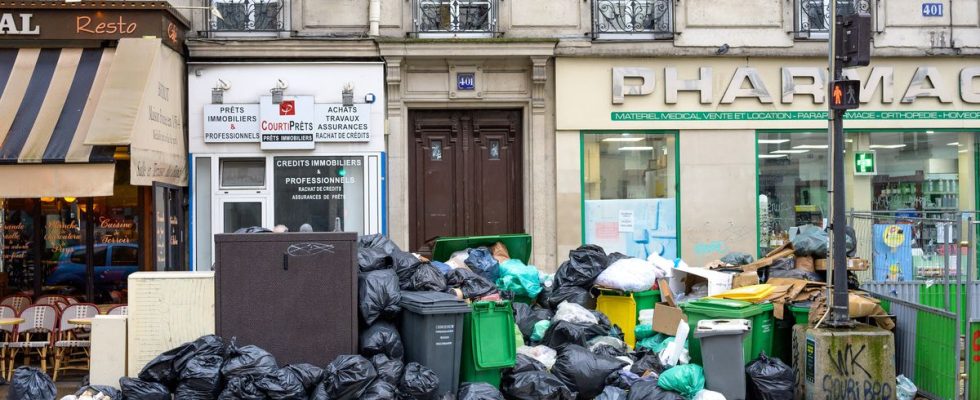“At least until March 20”: the garbage collectors and cleaning agents of the City of Paris, who contest the pension reform project, voted on Tuesday to continue their strike in the capital where waste is piled up on the sidewalks.
In the middle of the evening, because of the “sanitary conditions” prevailing in Paris, Gérald Darmanin instructed the Paris police chief, Laurent Nunez, to ask the town hall to “requisition” means in order to evacuate the garbage.
Some 7,000 tonnes of uncollected garbage were counted on the ninth day of the strike, according to the first deputy mayor of Paris, Emmanuel Grégoire, who deplores a “catastrophic situation created by the government”.
If the town hall does not respond to the request for requisition, “the State will replace itself”, advanced the entourage of the Minister of the Interior. This means that the State will requisition means to collect and evacuate the waste.
“We block but we don’t do anything”
Place Beauvau, we also mentioned the letter sent to the minister by the mayor LR of the 7th arrondissement of Paris, Rachida Dati, for him to intervene. An episode which comes at a time when the presidential majority needs the support of LR parliamentarians for the adoption of its pension reform which it hopes for Thursday.
On Tuesday, the blocking of the incinerator of Ivry-sur-Seine, south of Paris, continued and the strikers organized themselves to hold the pickets at night. “We block but we do not do anything”, says Julien Lejeune, 44, agent of the town hall of Paris in charge of waste water and CGT delegate. “We do guard shifts, we watch that there is no deterioration of the equipment or intrusion”.
The Ivry incinerator – the largest in Europe with nearly 700,000 tonnes of waste treated each year and managed by the public operator Syctom – has been shut down since March 6, as is that of Issy-les. -Moulineaux (Hauts-de-Seine), also on strike. That of Saint-Ouen (Seine-Saint-Denis) is undergoing maintenance.
The strikers say they feel “supported by the majority of the population”. “We see that public opinion is on our side, it’s nice,” said Guillaume Konrad, 38, head of the Paris sewer office. “Even the police came yesterday (Monday) to encourage us,” he says.
Provincial towns affected
The movement also affects some provincial towns. In Rennes, the strike started on Monday and the collection could not be carried out on Tuesday, according to the Suez group, which is responsible for it. Collection is also disrupted in Saint-Brieuc (Côtes-d’Armor).
Actions also disrupted waste collection in Nantes, as well as in Seine-Maritime. Tuesday morning, “a hundred demonstrators blocked the trucks” at the waste treatment center of the Metropolis of Rouen, assured Gérald Le Corre of the CGT departmental union.
The town hall of Paris, whose agents manage the collection of household waste in half of the arrondissements, says it is “solidarity” with the social movement. A position attacked by the government.
On Tuesday, the Minister of Transport, Clément Beaune, declared on France 2 to expect the mayor of Paris “to take concrete measures such as the pooling of collection and storage between districts, even the requisition”. “The requisition consists in forcing strikers to come and do their job: it is a competence of the State on a problem created by the State”, replied Emmanuel Grégoire in the afternoon.
The City “is putting in place palliative measures” and “it is more than the minimum service” which is provided with 23,000 tonnes collected out of 30,000 in ten days, he said, acknowledging to have recourse to private agents “on absolute emergencies.

